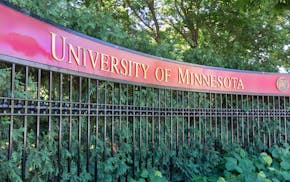Officials from Minnesota State University Mankato have announced significant trims to the school's academic programs — about 30% of them will be cut — and some faculty and students are upset with the change.
Mankato previously offered a total of 306 degrees and certificates, but beginning next fall, that portfolio will include just 216, a number school officials said is comparable to what other universities in the Minnesota State system provide.
Winona State University, for instance, has 150 programs, and Moorhead State University has 113, officials said.
"There wasn't much for me to choose from [when signing up for classes next semester]," said junior Elena Wood, who is majoring in international relations, which is being rolled into the political science department and losing its bachelor of science degree. "I did choose this school specifically for its anthropology and international relations programs."
The bachelor of arts degree will still be available, a common occurrence with many of the undergraduate cuts where two degrees were offered.
"It became clear that 80% of our students were enrolled in 20% of our programs," President Edward Inch said in an interview. "And so it became partly a budget issue but also an issue to make sure that we had capacity in the areas where we had demand."
Disciplines on the chopping block include French, German, art history, music and international business among baccalaureate degrees. The school is also eliminating master's degrees in French, Spanish, theater arts, engineering, gender and women's studies and mathematics education.
Among certificates at the undergraduate and graduate level, renewable energy, critical thinking, gender and women's studies and culturally responsive teaching are being axed.
The new total includes 12 new offerings in areas like public health, artificial intelligence and public policy.
The university cycles through a process of "strategic budget planning" every three years, Inch said, with the last cuts in 2022. But he said he can't recall a time in Mankato's past when this amount of paring was done.
"I'm a big fan of French and German, but if students don't find relevance in the program and choose not to enroll in it ... it doesn't really matter," Inch said. "The question with any of these that I've asked is, can you retool in a way that will draw students?"
The university will offer all current students the chance to have their program "taught out" by faculty. Incoming students with intentions to major in the cut programs will have "personalized advising appointments" to walk through options. Faculty layoffs could still happen, he said, but more likely the changes made will influence future hiring decisions.
The edits will save about $2 million per year, with some of that in new revenue coming in, Inch said. Among 18,400 current students at Minnesota State Mankato, 416 are affected by the cuts.
Subjects like health sciences and engineering are in demand, he said, adding that he was surprised at the degree of cuts in the arts and humanities. Cutting high-quality programs that aren't attracting enough students is always the hardest, Inch said.
"There were tears yesterday and I get it, because those are really hard," he said.
The cuts weren't just about money, Inch said, adding that some programs were kept "because universities ought to have them, or they serve an important reputational factor, [and] they serve the community," he said.
An example is the Indigenous studies degree, which has lower enrollment but is an important part of people's lives and history in the Mankato area, Inch said.
Minnesota State institutions make programmatic adjustments all the time, said Noelle Hawton, the system's spokesperson, but Mankato has "undertaken a bigger, more comprehensive review." St. Cloud State University made similar program cuts last summer. About 100 programs were slashed last May along with 57 faculty jobs at St. Cloud; 175 faculty positions will be cut as part of a five-year plan there.
'Something we can live with"
Laura Harrison, a professor of gender and women's studies, said changes at Mankato have come in phases for her over the past few years: First, the joint College of Humanities and Social Sciences was created from separate colleges. Then, the history and gender and women's studies departments were combined. Last week, three degrees — the bachelor of arts, master of arts and master of science — and a graduate certificate were slashed, leaving just the bachelor of science degree and an accompanying minor as options.
Mankato offered the first master of science degree in gender and women's studies in the nation; the university's master's offerings were the only two stand-alone master's degree options in the state, she said.
"Now, there's no opportunity that we know of," she said.
Harrison said at a time when gender and sexuality issues are under attack nationally, she and her colleagues "don't want to step away" from teaching about them. There are 12 students in the master's programs now, and admittance has been steady.
The graduate programs' suspension "is quite devastating," said Maria Bevacqua, also a gender and women's studies professor at Mankato, adding that the programs attracted students nationally and internationally.
"We feel so gutted," Bevacqua said.
Jameel Haque, a professor of history, said his discipline used to offer five degrees but will no longer offer the bachelor of arts and the master of arts.
He noted that the cuts come as higher education is being devalued across the country, with the humanities specifically a target.
"The university shouldn't be thought of as you have these separate programs," Haque said. "It's an ecosystem."
He's lucky that little will change in his department when compared with others. But the cuts impact faculty morale and could mean fewer students enroll in Mankato in the future, he said.
"We're worried about the students looking at the university and the programs [asking], 'What's wrong here that they're cutting programs?'" Haque said.
The changes are a mixed bag for his department, said Fred Slocum, a political science professor. While a bachelor of arts and a graduate certificate in political science will go away, the department will now offer bachelor of science degrees in political science, international relations and public policy; the latter is brand new. He's grateful the bachelor of science degrees will remain.
In contrast, Slocum said, his music department colleagues are "shell-shocked" to be losing their bachelor of arts degree, the only undergraduate one offered.
"[The cuts] are something we can live with for the greater good of the university," he said.

After signaling council would repeal police advisory board, Brooklyn Center OKs scaled-back version

Charges: 2 teens among 3 who lured drug dealer into deadly trap at Twin Cities riverfront apartments

Federal judge orders release of Mankato student arrested by ICE

Drunk, unlicensed driver who fatally hit University of Minnesota student gets prison term

